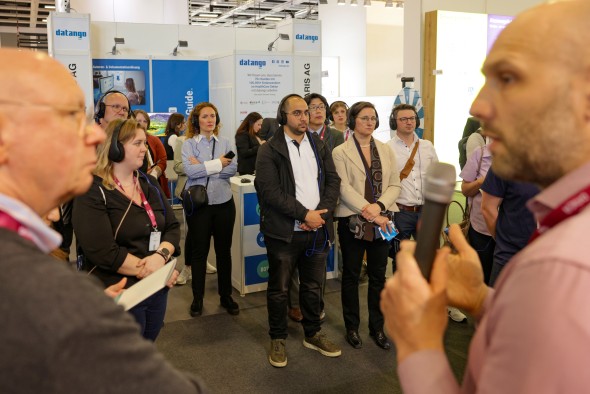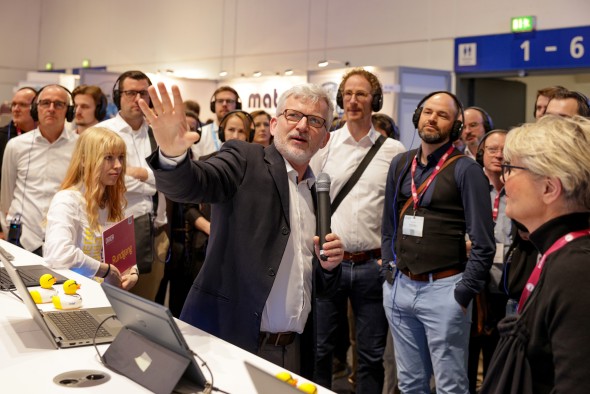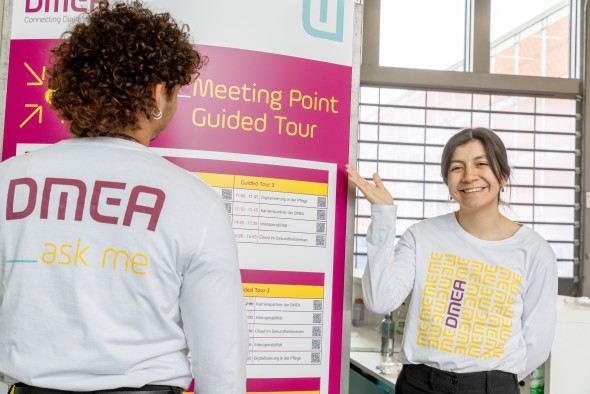Page content
Guided Tours of DMEA

Ready to get you up to pace!
The Guided Tours of DMEA offer a unique opportunity for exhibitors to present their latest products, services and technological developments to a broad specialist audience. They are also an ideal platform to position a company as pioneer in the field of digitalization and technological developments in the healthcare sector.
For all visitors, the guided tours offer structured and focused insights to the most exciting questions and solutions at DMEA: You can specifically target the topics and exhibitors that are particularly relevant to you and your professional practice. This will give you a comprehensive overview of new trends, future-oriented technologies and digital applications.
Key facts about the Guided Tours
- 13 selected key topics
- Visit to max. 4 stations per tour with max. 8 min of presentation per exhibitor
- Presentations at the exhibition stands of the exhibitors involved
- Free participation for all trade visitors
- Registration on site at Meeting Point, Upper Floor South Entrance
Key Topics 2025
Medication therapy safety (AMTS) is one of the biggest challenges in the healthcare sector. Drug interactions, incomplete medication plans and a lack of transparency regarding the medicines taken by patients can lead to serious treatment errors.
With the introduction of the “ePA for all” from January 15, 2025, digital solutions for the area of medication will be rolled out in stages, providing a comprehensive and up-to-date overview of medication.
This session will offer you valuable insights into the latest developments in drug therapy safety and shows how the ePA for all can help to better identify potential interactions and avoid incorrect treatments.
This session presents solutions that make the exchange between doctors and patients more efficient.
The focus revolves around assistance systems that are based on medical guidelines and enable doctors to make informed decisions and communicate with patients in a clear, structured manner.
In addition, digital tools such as patient portals and apps will be presented that improve the dialog between doctors and patients and actively involve them in the treatment process.
The presentations are adressed at a specialist audience of doctors, practice managers, healthcare providers and technology experts.
Digital healthcare is shaping the future of medicine.
Tp this, exhibitors of DMEA 2025 will showcase essential products and solutions that drive connectivity, efficiency, and digitization, creating new opportunities for modern patient care.
In this general-themed session, we offer exhibitors whose offerings do not seem to fit the predefined Solutions Hub key topics the opportunity to present their products and services to the expert audience.
Software-based solutions that support treatment processes are becoming increasingly important. Particularly in the areas of practice management systems (PVS) and electronic patient records (ePA), innovative applications offer the potential to optimize administrative processes and improve medical care.
This guided tour will showcase the latest developments and requirements for treatment process-supporting software. Participants will gain insights into best practices and learn how modern technologies can make the workflow in medical practices more efficient.
The tour is adressing in particular doctors, developers, IT service providers and healthcare facilities interested in optimizing their digital processes.
Cloud computing already plays a major role in many sectors, including healthcare. However, health cloud computing in particular faces massive obstacles due to concerns regarding data privacy and the safety of sensitive health data, and because of wide-ranging scepticism among decision-makers and users and unresolved legal issues.
All the while, the potential for improving medical care is immense, from being able to store and process data, the availability of computing power, to the provision of complete user applications.
On this guided tour, we want to highlight the benefits cloud computing can offer for healthcare and how existing obstacles can be sensibly overcome.
After one year of the Health Data Utilization Act, it is clear that the Health Data Utilization Act has laid the foundation for data utilization; now the newly created potential must be tapped and utilized in order to have a lasting impact on everyday healthcare.
From patient anamnesis to follow-up documentation, immense amounts of health data are collected every day.
However, it is clear that the key to success lies not only in a legally secure framework, but also in the implementation of innovative solutions that improve the willingness of data donors to provide data.
Alongside the large market for service providers, a patient-focused offering is increasingly emerging. This aims to give patients confidence in dealing with their illnesses: Whether dealing with symptoms, correctly assessing and reacting to adverse outbreaks when checking their own vital signs or becoming more actively involved in therapy.
Empowering patients not only improves care and simplifies treatment, but also gives those affected a better quality of life.
Software, tools and other applications that were previously only available to medical and nursing staff will increasingly be used by the patients themselves, and electronic patient records will also be in the hands of the patients themselves in future, with only the patient deciding who has read and write access.
Digital health applications (DIGA), which have already arrived in healthcare and are already making a significant, digitally-supported contribution to healthcare, should be mentioned here in particular. Patients can use DiGAs to actively support the course of their treatment and are therefore in close contact with doctors. This makes it all the more important to inform patients about the potential and possible risks so that they can not only handle their own data responsibly, but also gain a better understanding of their own health.
Fast and beneficial documentation, more efficient care and administrative processes or better communication with the interdisciplinary team (e.g. doctors, physiotherapists, occupational therapists, pharmacies, etc.) are just a few examples of what the digitalization of care promises.
The aim is to relieve the burden on care recipients, their relatives and the caregivers themselves, as well as to increase the self-determination and participation in social life of care recipients.
It has not only been decided that around 36,000 outpatient and inpatient care facilities will be connected to the TI from July 1, 2025; telecare, digital documentation and assistance systems or AI in care, among other things, will also increasingly find their way into the care landscape. The draft of the Nursing Competence Act, which will also allow nursing professionals to prescribe remedies and aids in the future, and future electronic billing and electronic performance records will also affect the care sector.
On this guided tour, we would like to highlight the opportunities and challenges of digitalization in care and what still needs to be done to make it a success.
In order to achieve interoperability in healthcare and research in Germany, the use of international standards is particularly important. Both syntactic standards such as FHIR and semantic standards such as SNOMED CT and LOINC play a central role here.
These standards enable structured and consistent data exchange across system and sector boundaries, which leads to better networking of healthcare data. Solutions based on these standards help to promote interdisciplinary exchange and create a sustainable, data-supported healthcare infrastructure.
This guided tour will show that the use of such standards can not only improve the efficiency and quality of medical care and research, but also optimize the management of healthcare data.
This tour is exclusively reserved for DMEA sparks Partner.
DMEA sparks Partner actively and directly support DMEA's young talent program, at which we show students and graduates the many opportunities in health IT. Find out more about the DMEA sparks Partner benefits and opportunities!
Artificial intelligence (AI) is in the process of fundamentally transforming healthcare - including in the outpatient sector. In order to tap into the potential of this technology, exhibitors on this guided tour will present their specialist knowledge in practical contributions.
They will show how AI can make outpatient care more efficient, patient-centered and useful by providing diagnostic support or therapy recommendations. The focus is on innovative approaches and their benefits for patients and service providers. Specific use cases as well as technical and regulatory topics in different application scenarios are of interest here.
The presentations are adressed at a specialist audience of doctors, practice managers, healthcare providers and technology experts.
Artificial intelligence (AI), machine learning and algorithms have been on everyone's lips for years in the context of the digitalization of healthcare and have also been omnipresent in the media, at the latest due to the debates surrounding chat GPT and the European Union's AI Act. According to representative surveys, over 50% of the German population already use AI privately or professionally.
Beyond marketing promises, the new processes have already found their way into everyday medical practice in many areas, whether for clinical decision support or for use by patients. Many current use cases sounded like science fiction a few years ago - but the future is now, and the potential of artificial intelligence in all areas of care can hardly be overestimated.
Without the telematics infrastructure (TI for short), nothing would work in the German healthcare system today. This secure data highway, as it is often called, offers the possibility of exchanging information between all stakeholders in the healthcare system. The portfolio of available TI applications continues to grow:
From e-prescriptions and the TI messenger to electronic patient files, insured persons, service providers and health insurance companies are digitally connected with each other. Switching from the original hardware-based to a software-based connection makes access much easier for everyone involved. Thanks to its increasing prevalence, the TI and its applications now offer the unique potential to rethink healthcare in a new, more connected and more efficient way.
Guided Tours in English
This tour will be held exclusively in English. Please note that only bookings for English presentations will be accepted.
Digital healthcare is shaping the future of medicine.
To this, exhibitors of DMEA 2025 will showcase essential products and solutions that drive connectivity, efficiency, and digitization, creating new opportunities for modern patient care.
In this general-themed session, we offer exhibitors whose offerings do not fit the predefined key topics for the guided tours the opportunity to present their products and services to the expert audience.
This tour will be held exclusively in English. Please note that only bookings for English presentations will be accepted.
Artificial intelligence (AI), machine learning and algorithms have been on everyone's lips for years in the context of the digitalization of healthcare and have also been omnipresent in the media, at the latest due to the debates surrounding chat GPT and the European Union's AI Act. According to representative surveys, over 50% of the German population already use AI privately or professionally.
Beyond marketing promises, the new processes have already found their way into everyday medical practice in many areas, whether for clinical decision support or for use by patients. Many current use cases sounded like science fiction a few years ago - but the future is now, and the potential of artificial intelligence in all areas of care can hardly be overestimated.
Key facts about the Guided Tours
- 13 selected key topics
- Visit to max. 4 stations per tour
- Max. 8 minutes of presentation time per exhibitor
- Bookings open from January 14, 2025 | Bookings close on February 13, 2025
- Booking of presentation slots only for registered exhibitors of DMEA 2025
- Standard price EUR 550 per presentation slot (plus VAT)
- Beneficial price for bvitg Members: EUR 490 per presentation slot (plus VAT)
- Presentations at the exhibition stands of the exhibitors involved
- Free participation for all trade visitors (registration on site)
Booking period for exhibitors
- Bookings open for registered exhibitors of DMEA 2025: January 14, 2025
- General booking deadline is February 13, 2025, 11:59 pm
Due to the limited number of available presentation slots, individual topics may be fully booked before the end of the booking period. The individual presentations will be placed after the end of the booking period.
Open Q&A sessions for the Guided Tours
For all interested parties, we are offering complimentary Q&A sessions where you can find out everything you need to know about this format and ask us your questions live:
- Q&A Session: Thursday, January 16, 2025, 2:00 p.m.
- Q&A Session: Thursday, January 30, 2025, 2:00 p.m.
Booking period for exhibitors
Bookings can be placed from January 2025. Further details will follow shortly.







